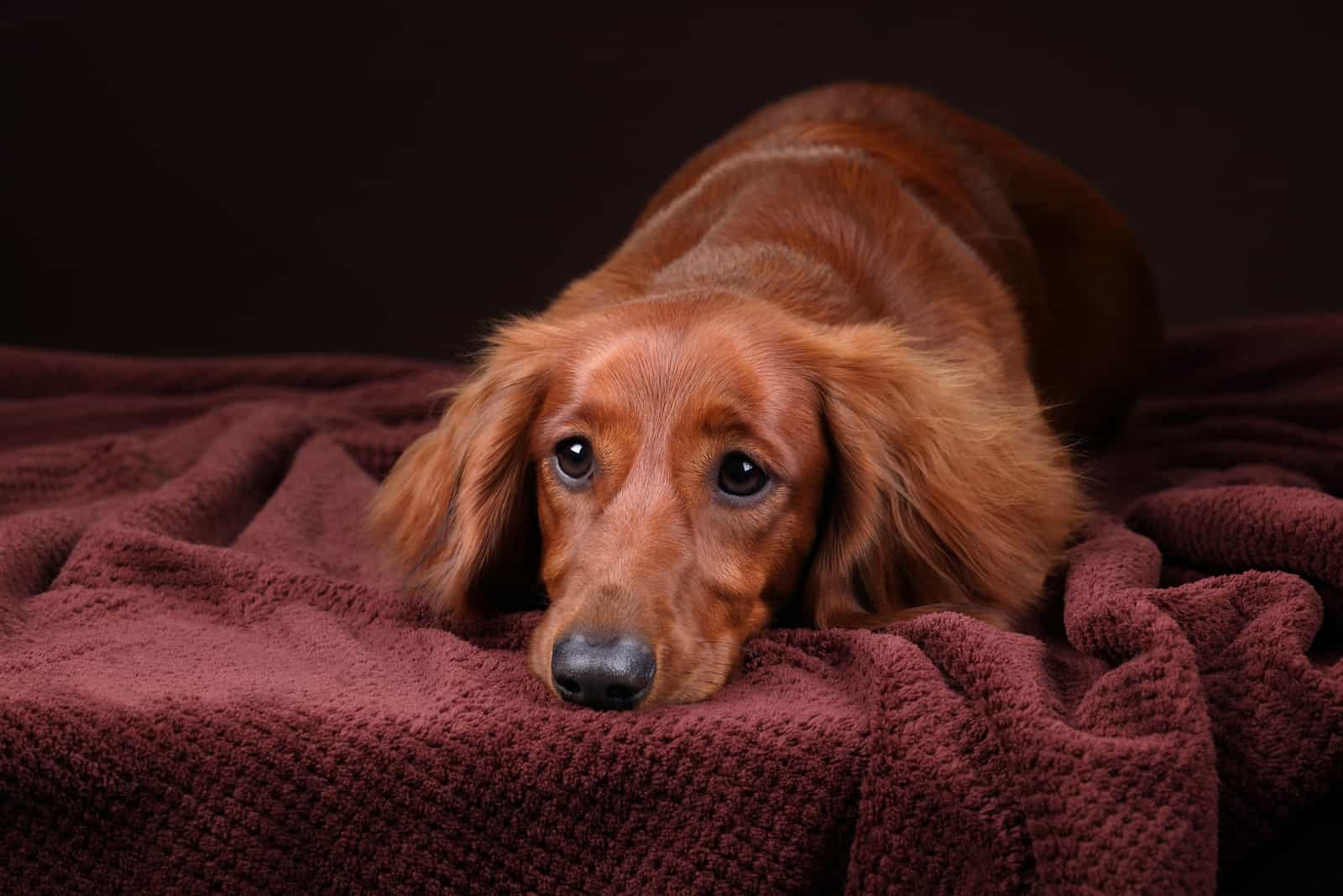Dachshunds are something of an enigma of the doggy world: they are small dogs with the fearless nature of a Dobermann. They are loving and affectionate but they can be aggressive when roused.
They have the deep bark of a hound but have the strangest shape, with a long body, tiny legs, and an elongated snout.
They are single-minded, intelligent, and independent and yet can be reduced to shivering in a corner at any moment.
So, what’s this all about? Why do Dachshunds shake?
The fact is, there’s a variety of reasons why a Dachshund owner might see their dog shaking.
We’re here to explore this behavior and find some answers, along with a few solutions that will hopefully resolve any problems. If you’re worried about your Doxie dog, then read on!
Why Do Dachshunds Shake? 9 Possible Reasons
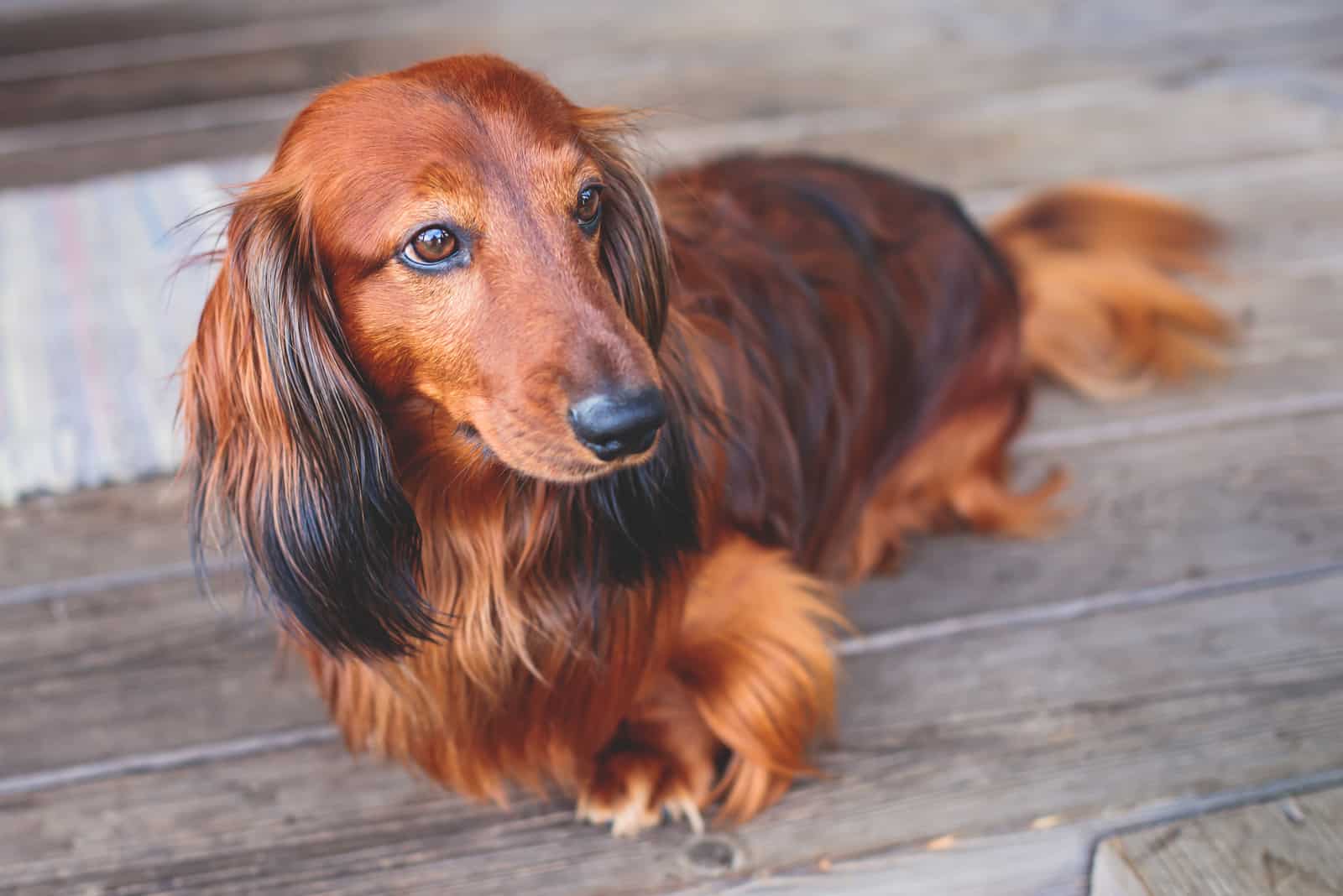
If you’re a concerned Dachshund owner, worry no more! Our list of possible reasons for Dachshund shaking will help to put your mind at ease.
Although some are serious, most can be resolved with a little bit of patience and effort.
By the end of this article, you’ll be equipped with all the information you need to overcome most of these issues.
However, it’s unlikely that you’ll eliminate shaking entirely, as it’s a natural response to some situations.
Even so, you’ll know what’s going on, so you can be confident that your furry pal is okay.
So, without further delay, let’s look at the possible reasons.
Body Temperature

We’ll start with an obvious one: your dog might be too cold.
Dogs generally have a higher body temperature than humans. Most dogs range between 101° F and 102.5° F, while humans are usually between 97.6° F and 99.6° F.
Dachshunds have less insulation than many other breeds. Because of this, your sausage dog can lose body heat quickly when exposed to cold conditions. They’ll curl up in a corner or in their doggy bed or seek out a warm place to sleep.
They will also shiver a lot, which can be worrying. Of course, this is more of a risk in the winter months, although, on cooler days throughout the year, you’ll need to be aware of the problem.
We’ve all felt the cold at some point, and we may have shivered when we feel an icy blast. This is a natural reaction, as the muscles twitch to create heat. It’s why we bundle up in extra layers when it’s cold!
Remedies
Invest in a doggy jacket for your furry friend to help them stay warm, especially in icy weather. Make sure they have a cozy place to sleep and give them blankets if necessary.
Why does my Dachshund shake? Because it is cold! Miniature Dachshunds may be even more at risk because of their size.
Separation Anxiety
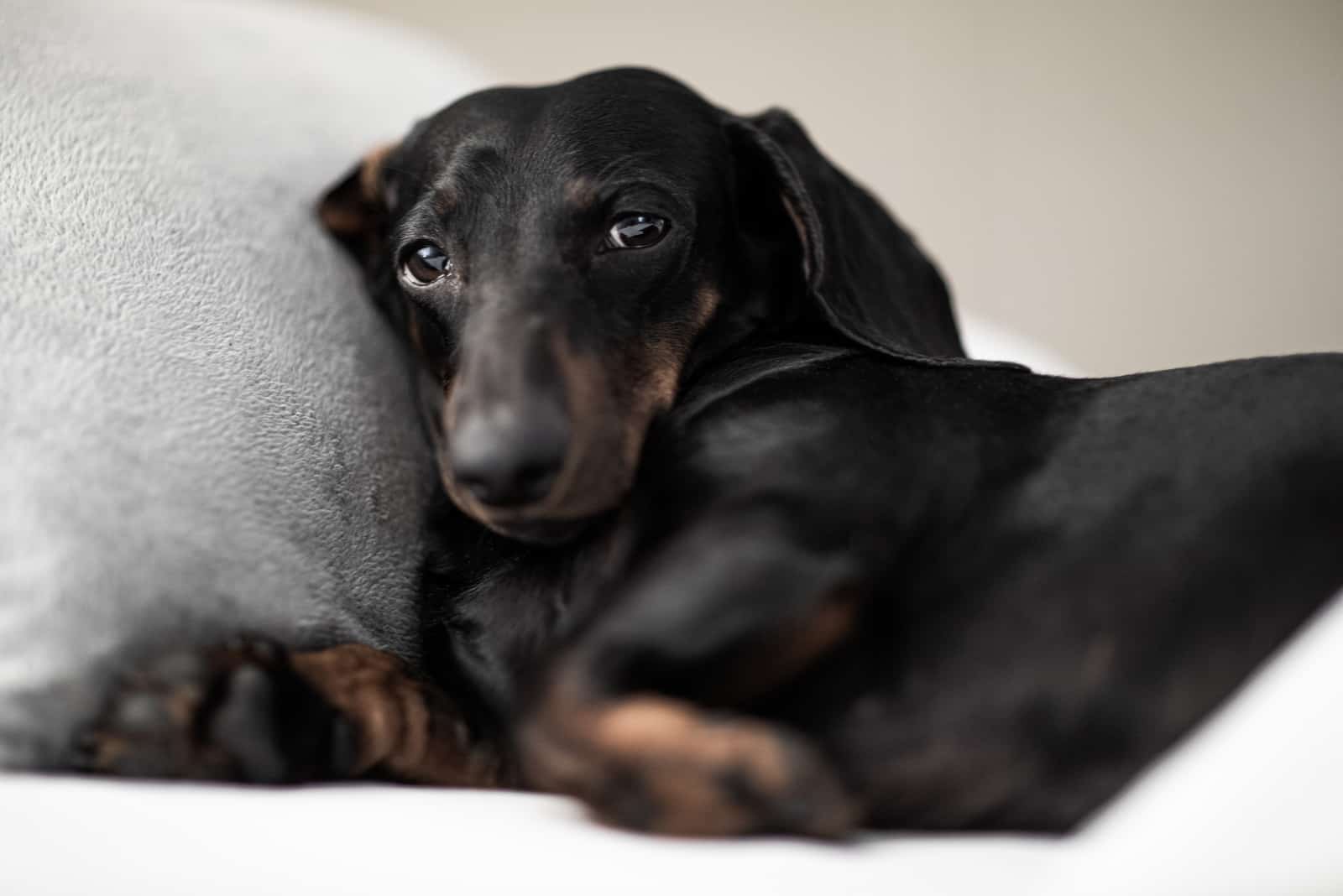
This is another pretty obvious answer. All dogs are devoted to their owners and families, and they miss you when you’re not there.
Being separated from you makes them very anxious, and they feel this keenly, almost like a panic attack. You won’t know that your little dog is shaking while you’re away, as you obviously can’t see it.
However, the anticipation of your leaving may set your pup shaking, so you will see the signs.
There’s a good chance your puppy will sit in a corner shaking for a long while. In some cases, they’ll still be when the owner gets home.
Separation anxiety is a big issue for millions of dogs and is often overlooked. This can lead to unwanted behavior, like urinating and defecating indoors, even though the dog is housetrained.
Dogs also become destructive, resort to non-stop barking, and can even become aggressive.
Most dog owners will believe that this is out of spite. However, the real cause is anxiety as they are confused and distressed because, in their minds, you have abandoned them, and they can’t handle it!
As sweet as Dachshunds are as a breed, they have a reputation for aggression. Being left alone could bring this trait to the surface even more.
Remedies
An adult Dachshund should never be left alone for more than four hours. If this is unavoidable, arrange for a friendly face to drop by for a while or use a dog walking or dog sitting service.
It’s also good to wear out your furry pal before you leave, as they will be more likely to sleep while you’re gone. Enjoy a fun-filled playtime or a long walk before leaving to use up some of that energy.
Also, try to normalize your absence by not drawing attention to it. Don’t fuss when leaving, as this heightens the dog’s awareness of being alone.
And on returning home, you should try to wait a few minutes before saying hello. It won’t be easy, but it will help them adjust.
Intelligent dogs recognize patterns in your actions. They know that you’ll be leaving after picking up your keys or putting on your shoes. Do these things at random times, then sit down again and stay home.
Eventually, your dog will learn that your absence is part of the daily routine and nothing to worry about. Still, leaving any dog for more than four hours a day is unfair. Most dogs are social, pack animals that thrive in company, especially humans.
If you can’t avoid leaving a dog home alone for extended periods every day, then perhaps you need to rethink your choice of pet.
Why do Dachshunds shake? Because they miss you!
Health Conditions
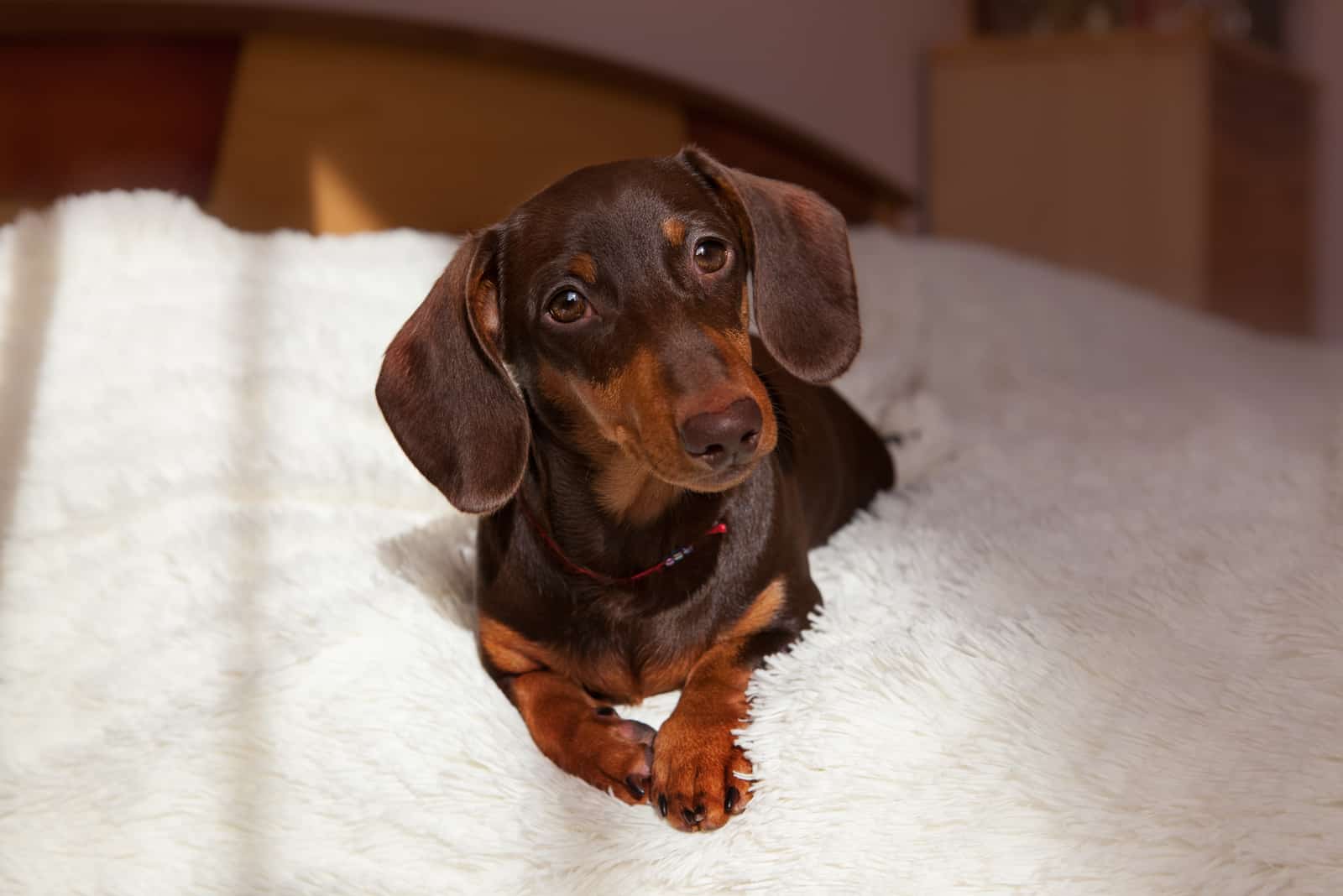
So, your dog is warm enough, and you’re home, so there’s no reason why your Doxie dog should be shivering and shaking so much.
If you notice your puppy shivering, especially if it doesn’t seem to stop, don’t ignore this, as it could be a sign of a more serious issue.
As with all dog breeds, Dachshunds are prone to several health issues that can cause shivers:
• Ear infections occur in most dog breeds. These are warm, moist, dark places, ideal for bacteria to grow. If ears aren’t cleaned regularly, infections will spread into the ear canal, which causes pain and irritation. One sign of an ear infection is excessive head shaking due to itchy ears. It’s essential to gently clean your dog’s ears about once a week.
• Ear mites are another possibility, with similar symptoms as an ear infection. You may notice a brown residue in the ears, and your dog will shake its head from side to side. The ears will be sore from excessive scratching. You can get medication to treat this, but it only kills the adult mites and not the eggs. The life cycle lasts approximately three weeks, so it may take this long to eliminate all of the mites.
• Colds affect dogs just as they do humans. Your pup may have a high temperature, a runny nose, and they may have sneezing fits. Various remedies exist, just as they do for us, but few are actually effective. Ensure they are kept warm and have access to fluids (clear soup or broth is good). If symptoms worsen dramatically or don’t get better within a week or so, contact your vet for advice.
• Kidney disease can be a killer, so this is one to watch out for! When kidneys fail, toxins aren’t filtered from the blood. These accumulate in the body, leading to various symptoms, including excessive shaking and tremors. Other symptoms are vomiting, diarrhea, extremely bad breath, and loss of appetite.
• Back injuries are a frequent risk for Dachshunds because of their short legs and unusually long body. It’s never good to keep a Dachshund if you have a lot of stairs in your home, as this puts extra strain on the dog’s back.
• Epilepsy is common in several breeds, including the Dachshund. However, there’s a difference between shaking and a full-blown epileptic seizure: your dog may foam at the mouth and roll on its back, paddling its legs. This is distressing for the pet and the owner and can be fatal in some cases.
• Joint problems (hips, elbows, kneecaps) affect many dogs, causing aches and inflammation. All dogs may tremble and shake when in pain. You can usually spot joint problems as your dog will start limping. Your vet can prescribe painkillers and anti-inflammatories to ease the problem, although surgery may be required for severe cases.
These are a few examples for you to watch for as they may be the cause of your dog shaking.
Why do Dachshunds shake? Because they are sick or in pain, so make sure you get them checked out by your vet!
Fear, Stress, And Anxiety
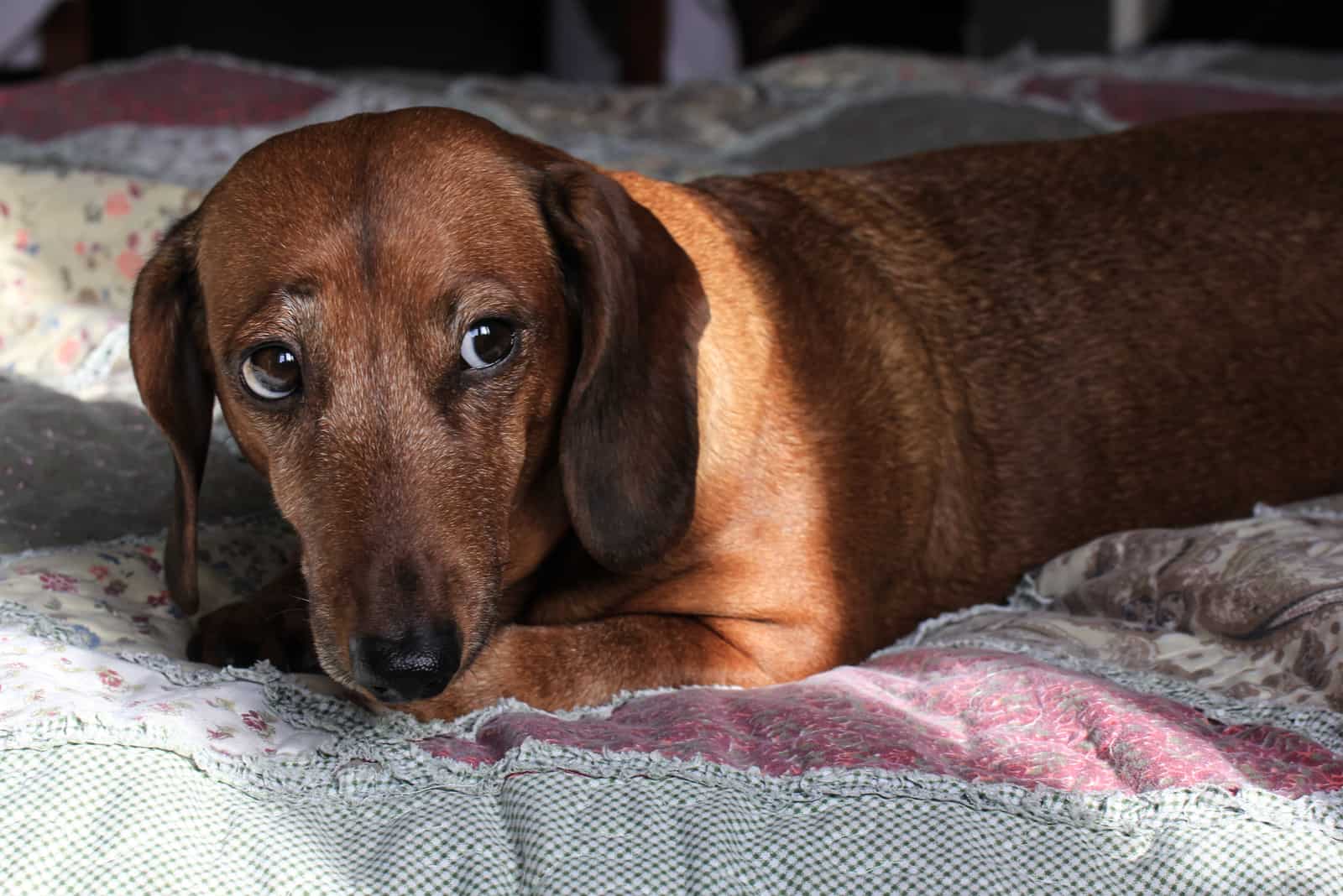
We have already dealt with separation anxiety, as this is a major issue in its own right. However, dogs get stressed, anxious, and fearful for many other reasons.
Some stressors are obvious: loud noises such as passing jet planes, fireworks, vacuum cleaners, and noisy traffic. Meeting strangers or animals for the first time can be stressful.
Many dogs can’t handle travel, so they’ll be stressed or anxious about getting in the car.
Moving house is a stressful time, as everything has changed. Dogs are also sensitive to changes in the family dynamic, like a child leaving to go to college or a baby arriving on the scene.
Rearranging your furniture or redecorating might even set your dog trembling! Dogs love routine, and any changes may affect them. This goes for inconsistent rules, too. Don’t cuddle them on the sofa one day, then shout at them for climbing onto it the next day.
There are many different triggers, but each of them will affect your pooch somehow, and with Dachshunds, it may result in tremors and shaking.
Remedies
Each situation is different and requires handling separately: you can’t control sudden loud noises from outside, though you could buy a vacuum cleaner that doesn’t make as much noise.
When your furry friend is scared by loud noise, try not to react too strongly. If they see that you’re okay with what’s happening, there’s a good chance they’ll settle down.
Be as consistent as possible and reassure your dog without making a fuss. This will give them confidence that you are in control and that all is well.
Why do Dachshunds shiver? Because they are scared, anxious, or stressed.
Attention Seeking
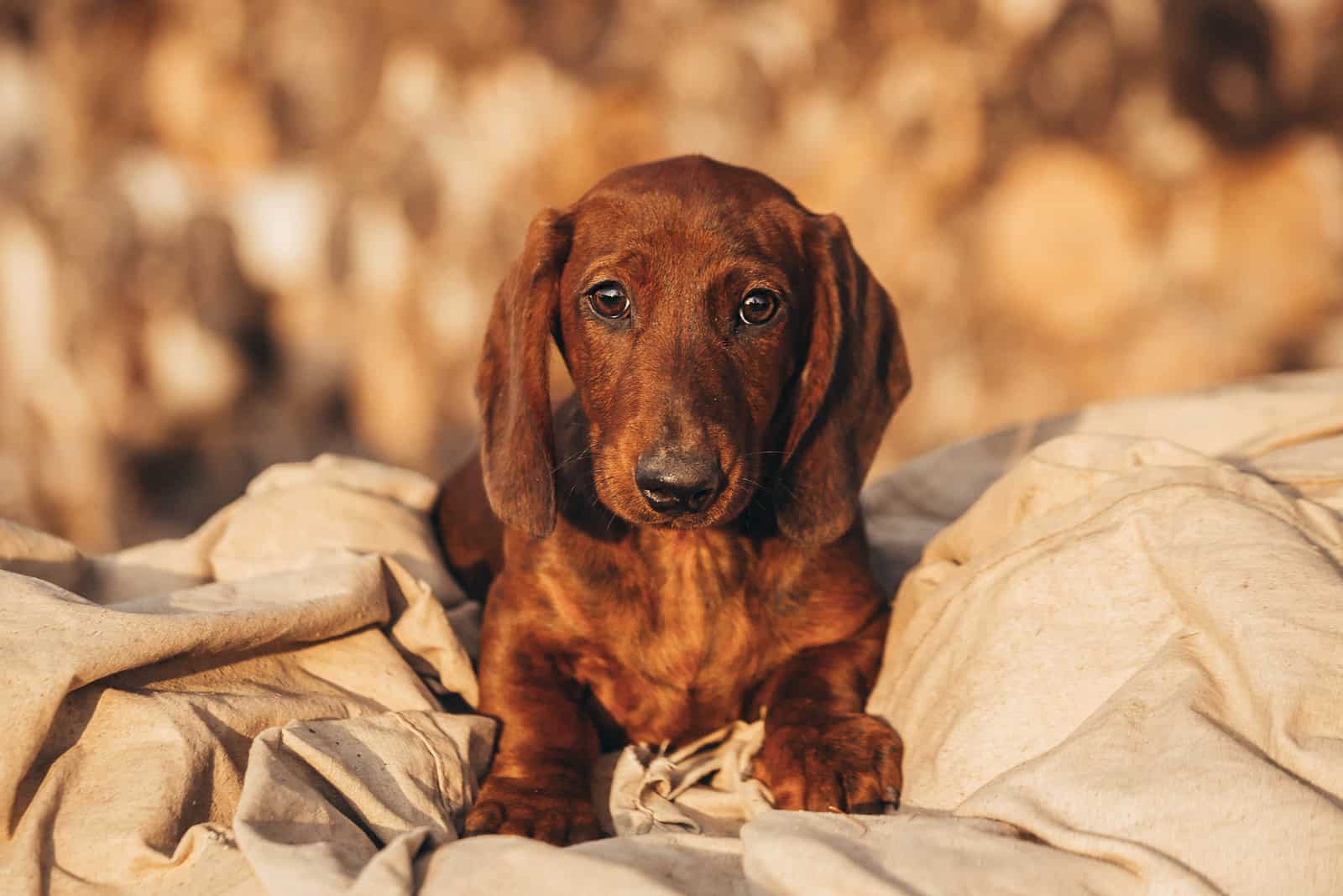
Whatever is causing your dog to shake, there is a possibility that they have learned from the experience. Doxie dogs are wily and intelligent, with a mischievous streak.
There’s a good chance they have connected shaking with getting cuddles: every time they shiver, you make a fuss, and they get extra cuddle time! They might even get a treat or two, so it’s a positive experience.
This is tricky to spot and difficult to cure – you don’t want to ignore it only to discover there’s a real problem.
The answer lies in ruling out any other cause as far as possible and toning down your reaction.
Why do dachshunds shake so much? Because they figured that it gets them noticed!
Excess Energy
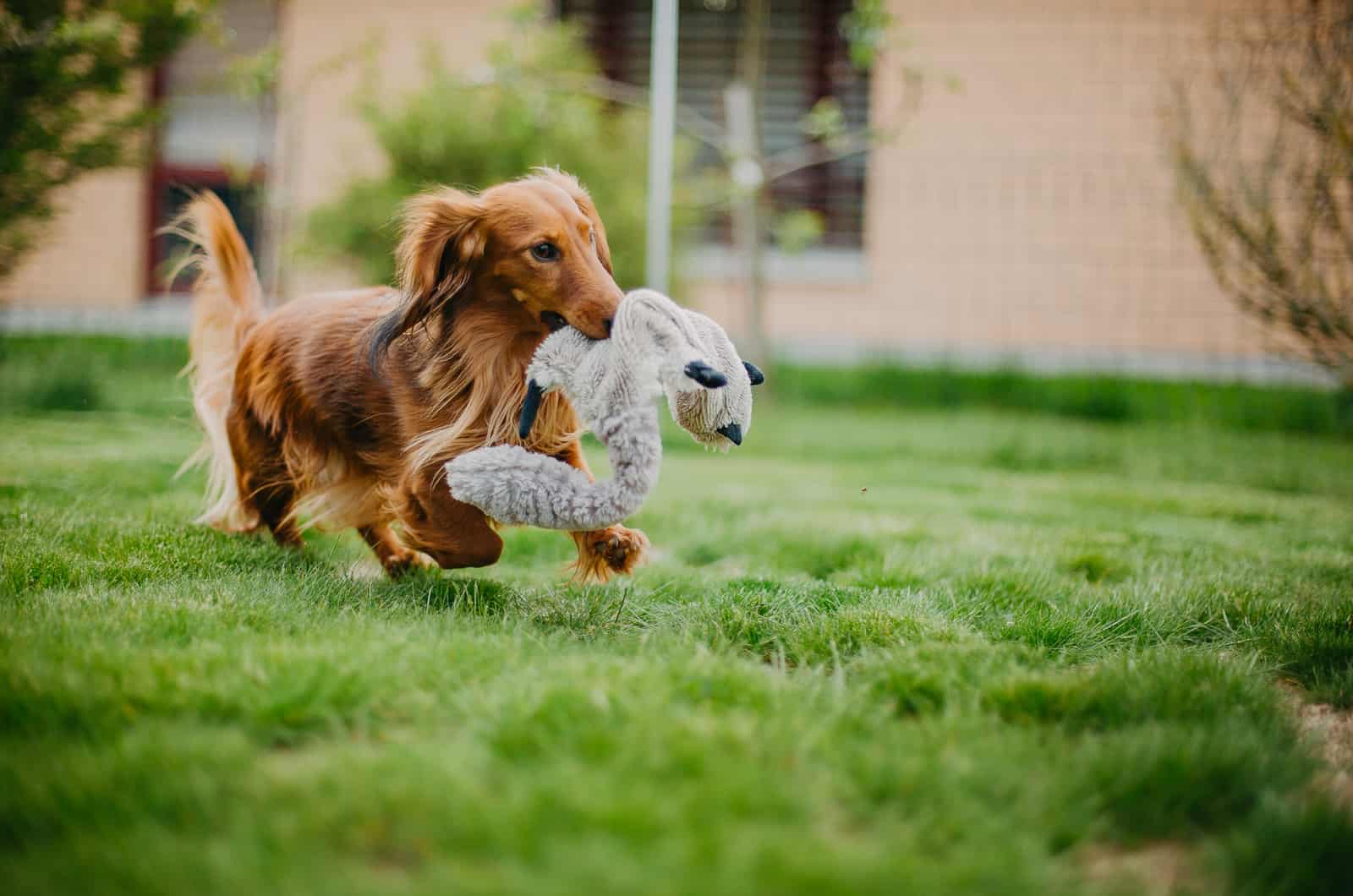
Energetic dog breeds are always up for playtime or a long walk. The Dachshund is astonishingly full of energy for its size! You’ll need to set aside at least one hour every day to make sure they use it all up.
In most breeds, excess energy leads to destructive behavior, especially in intelligent breeds that have been left home alone. If Dachshunds have access to a garden, they will dig. In fact, they are expert diggers! As a result, your flower beds will be at risk.
Why is my Dachshund shaking? It could have too much energy to use up!
Overexcitement
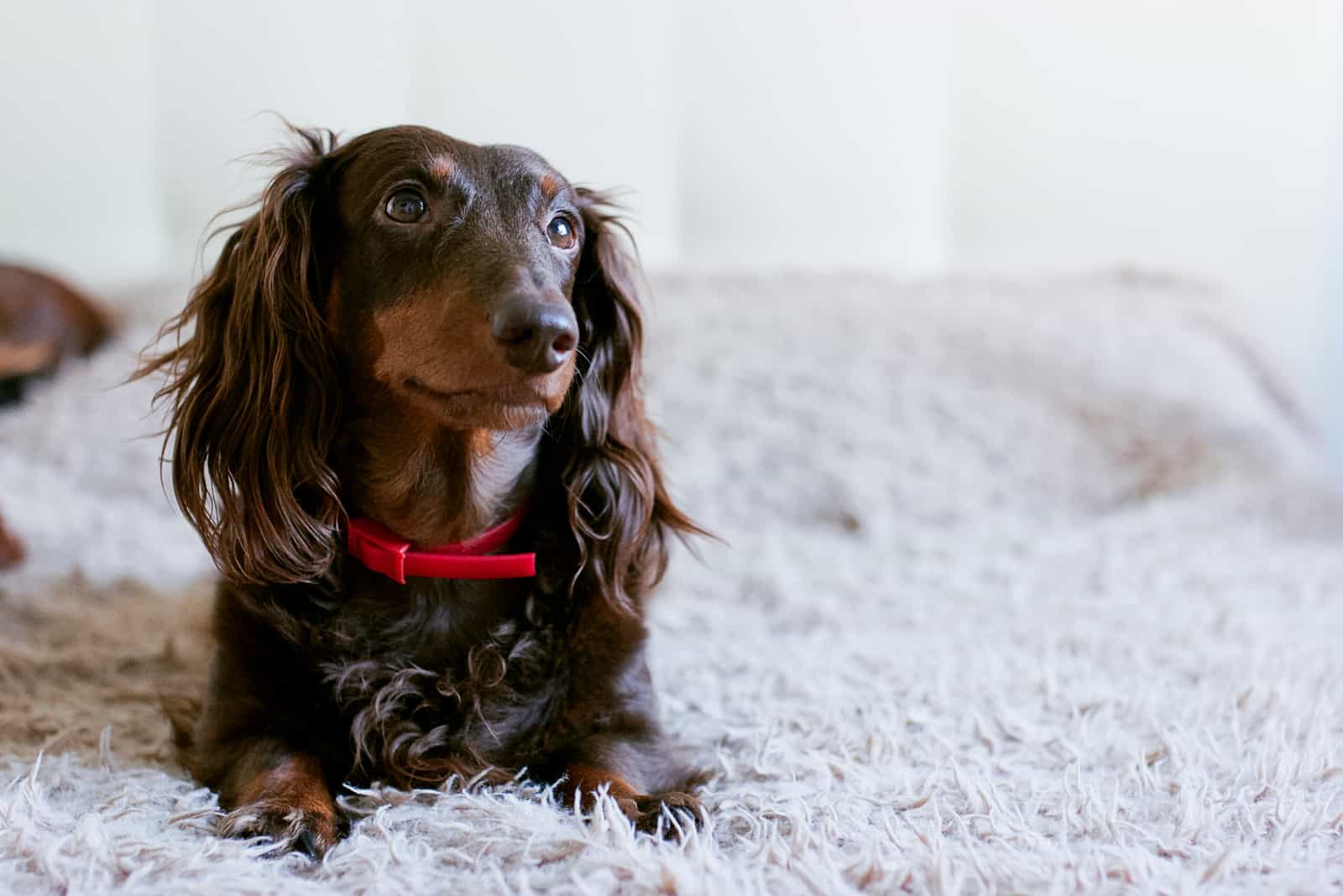
Yep, we’ve all seen dogs when they get too excited. It’s cute, but it can be a problem and sometimes messy, as some dogs are prone to submissive urination!
There’s nothing wrong with your dog being happy and showing its excitement. Dachshunds (and many other breeds) will tremble when excited, which is normal and natural.
Trembling uses up some of that excess energy, so it isn’t a bad thing. Even so, it can work the opposite way sometimes, and your pooch will wind itself into a frenzy. An overexcited dog can be challenging to control and may not always listen to commands.
Clearly, this is a potential hazard, so it’s always best to calm them down and regain control.
Why do Dachshunds shake? Because they got too excited.
Old Age
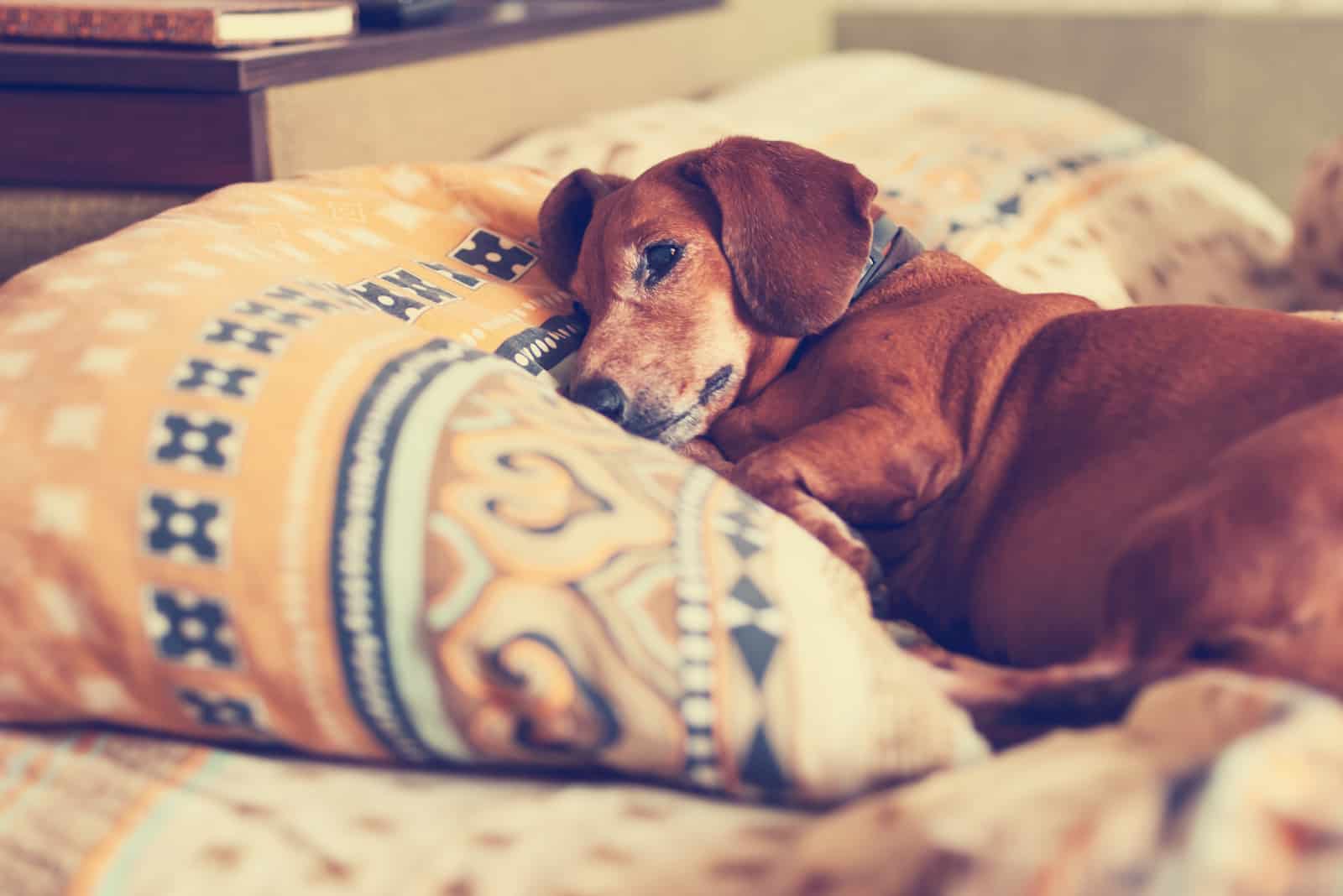
Sadly, old age comes all too soon for our furry companions, and it can bring all sorts of complications that increase the likelihood of shivering and shaking.
Sometimes, it’s a simple case that your dog’s joints are hurting. Then again, it could be that your poor old pooch is suffering from cognitive decline.
Old dogs start to deteriorate physically* and mentally, and ordinary everyday things can become stressful and confusing as their memory fails. This makes your dog anxious, and this will make its body shake.
*Muscles begin to waste away (atrophy), particularly in the hind legs
Older dogs are also more at risk of neurological disorders that can cause shaking, so getting your furry pal checked out by the vet is essential.
Your old dog will be less likely to have complete control of its bladder and bowels, so shaking might signify that they need to go to the bathroom.
Remedies
There isn’t much you can do except make them as comfortable as possible. Your vet will offer advice on caring for your dog and will provide medication to ease any pain or anxiety. If their quality of life deteriorates too far, your vet will discuss end-of-life care and euthanasia options with you.
No dog owner wants to consider this, but it’s an essential part of sharing your life with a canine buddy – you have to take the rough with the smooth.
Sometimes, your precious fur babies need a helping hand to cross the rainbow bridge rather than prolong a life of suffering and confusion.
Why does my Dachshund shake so much? It could be the effects of old age.
Generalized Tremor Syndrome (GTS)
We’ve left this one until last, as it’s a pretty rare phenomenon, also known as Shaker Syndrome, for obvious reasons.
Even so, it’s a possible reason for tremors and shaking in Dachshunds.
Diagnosing this syndrome can be a challenge, as the symptoms aren’t always easy to recognize. Your vet can run tests, but this involves cerebrospinal fluid being extracted under a general anesthetic. They’ll also need a complete chemical profile from the blood and urine and your dog’s entire behavioral and medical history.
Although a disease of the nervous system is sometimes responsible, it often doesn’t have an apparent cause. Either way, it can be treated using corticosteroids, which have a pretty good success rate, depending on the severity of the tremors.
While most dogs recover within a week, some will never fully recover, though this is very rare.
Why Do Dachshunds Shake? The Verdict
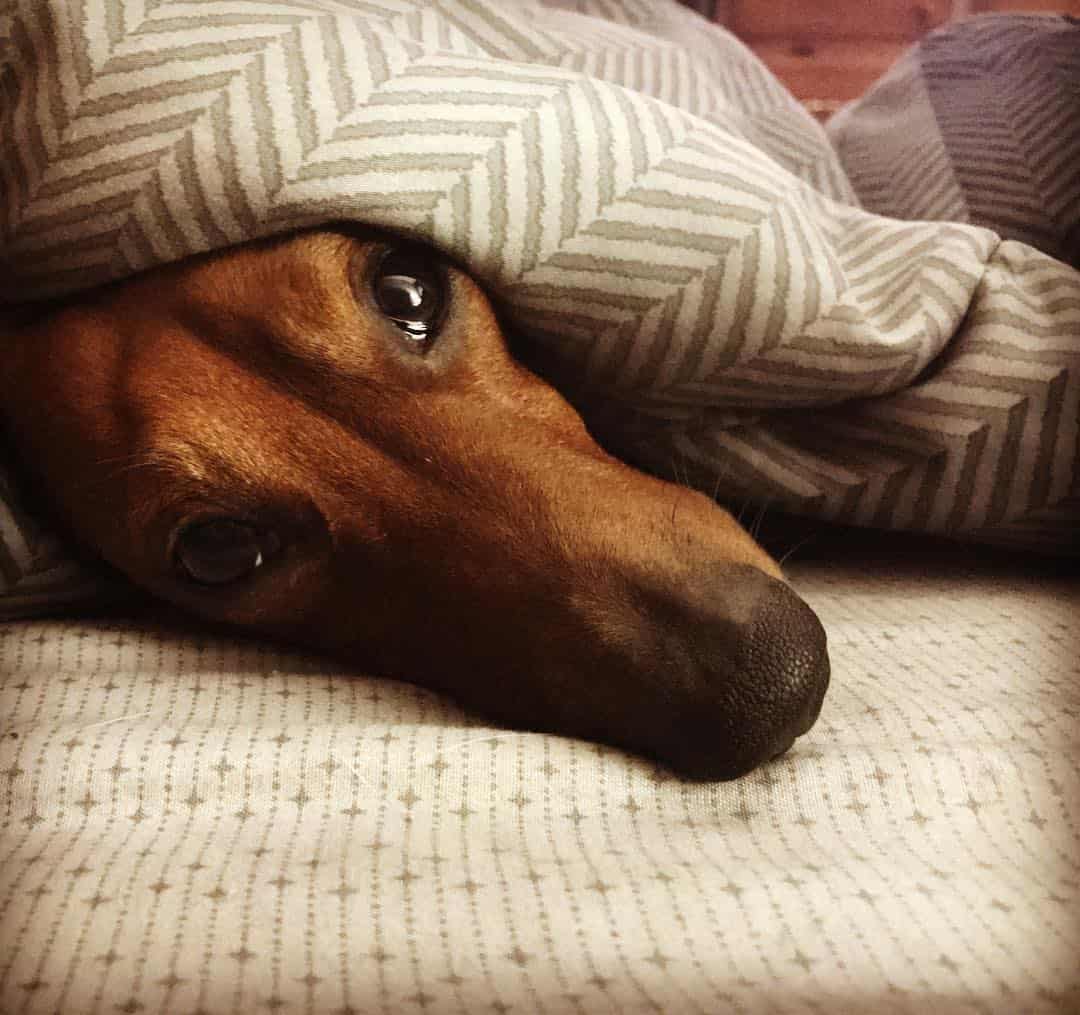
In fairness, we could have called this article, why do dogs shake?
After all, many breeds are prone to uncontrollable shaking, especially small dogs like the Chihuahua.
However, we focused on the Dachshund because it seems to have developed a reputation for shaking more than others.
Hopefully, you’ve learned enough from this guide to understand that it’s not always bad news! You need to look for other symptoms and rule out anything serious as quickly as possible.
Keep your furry friend warm, give them plenty of exercise and keep them entertained. Check for any signs of sickness or pain. Ease their fears and anxieties without fussing, and don’t let them fool you into giving them extra attention.
Okay, so we made it sound easy! To be fair, it will take some effort, but you’ll get there.
If you suspect your pup is sick, you should contact your vet immediately. Quick diagnosis and treatment are essential, as some of the conditions listed here can be fatal.
However, the chances of severe sickness are low, so don’t go into panic mode every time your pooch trembles!
It seems that trembling is a part of being a Doxie dog. Your job is to monitor this to make sure all is well. It won’t always be easy, but you’ll do it because you love your dog.
Read Next:
• 6 Dachshund Terrier Mixes For Every Owner
• Dachshund Feeding Chart: A Look Into A Wiener Dog’s Diet

